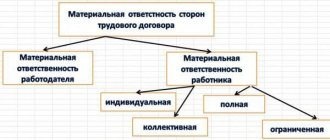Programmer job description: for whom it is compiled
The position of a programmer is one of the most potentially intensive in terms of determining the job functions that this specialist performs. This person could be, for example:
- software engineer (developer or web developer);
- programmer technician;
- system programmer.
The job responsibilities, rights, and responsibilities of a programmer, as well as the features of his interaction with management and other specialists, can vary significantly depending on the specific position.
But most often, when they talk about the position of a programmer, they mean a software engineer who solves applied problems related to the development of software, scripts, and programming concepts.
In some cases, it can solve very narrow problems - for example, those related to ensuring the functioning of specific applications, such as 1C.
What does a programmer do?
There are a lot of areas of activity that are, one way or another, related to programming. Therefore, before considering the job description (JI), it is worth considering the main areas of activity.
Depending on the function performed, the directions indicated in Table 1 are distinguished.
Table 1.
| Name | Description |
| Front-End Developer | A specialist responsible for the appearance and user interface of websites and web applications. To work as a Front-End developer, a developer needs not only programming skills, but also web page layout and design through cascading style sheets. Skills in working with graphic editors will not be superfluous. |
| Back-End Developer | Unlike Front-End, it develops structural components of the site, server elements, and databases. To work in this direction, you need to know 1 or more programming languages, have the ability to work with frameworks, third-party libraries, and UDB systems. |
| Mobile application developers | When creating software for smartphones, Python, Java, and JS are commonly used as the main programming languages. Specialists in this category should also have a certain understanding of the functioning of mobile operating systems. If they have the necessary knowledge, such specialists can work in the appropriate development studios. |
| Testers | A programmer who takes part in testing a program or its individual component. To check the functionality of software, special testing programs are usually created that simulate various situations. In addition to programming, a specialist needs to know the basics of working with databases and the algorithm for administering various operating systems. |
| Systems Engineers | This is a technical specialty that can only be obtained at a university. These programmers are responsible for developing programs to control various devices, instruments, and production automation systems. In addition to a large amount of technical knowledge, the job will require education in the industry in which the specialist wants to work. |
On a note! In Russia, it is also customary to call specialists who work with 1C software programmers. In fact, 1C is not an independent programming language, despite the fact that it has a number of similarities with them. Specialists in this area are also in demand at enterprises.
It should be noted that the above list is not exhaustive. However, these areas in the field of information technology are considered the most in demand.
Who is a system administrator, look at the video:
Job description of a general software engineer: content features
Instructions for a software engineer can be drawn up based on the characteristics of this position, which are listed in the Qualification Directory, approved by Decree of the Ministry of Labor of the Russian Federation dated August 21, 1998 No. 37.
This document states that the job responsibilities of a software engineer include:
- development, testing and adjustment of programs designed to process information in order to solve work problems;
- determination of information to be processed, its main characteristics;
- development of instructions for created programs;
- adapting solutions for specific user groups, as well as for the general public;
- creating program catalogs;
- designing solutions designed to expand software application areas.
In the Qualification Directory, the position of a programmer is classified into four categories:
- The first corresponds to a programmer who has a higher education and work experience as a developer of the second category, which is three years or more.
- A second category programmer is a developer with a higher education and work experience as a third category developer of three years or more.
- A programmer of the third category is a developer with a higher education and any work experience.
The directory also provides for a programmer position without a category. Namely, an employee who may have:
- secondary education and work experience of at least three years as a first category technician;
- secondary education or five years of work experience as a specialist;
- higher education - no experience requirements.
And yet, in practice, in most Russian companies, the qualification requirements for candidates for the position of programmer correspond to those that characterize the position of a developer of categories 1, 2 and 3. That is, it is assumed that the programmer still has a higher education. Depending on the profile, size, and fame of the company, the severity of the requirements for work experience, which will be reflected in the instructions, can vary significantly.
The programmer's instructions also indicate a list of knowledge that guides him in his work. In general, this list is the same for all categories of developers and includes, if you follow the Qualification Guide, knowledge of:
- methods of working with algorithms and programs;
- basic approaches to structured programming;
- specifics of the software used;
- devices and operating features of various PCs;
- methods of information processing;
- programming languages;
- fundamentals of labor, civil legislation, labor protection standards;
- fundamentals of economics, production technologies.
Programmer - who is he?
A programmer is a specialist who develops algorithms and computer programs based on special mathematical models.
Most often, people in this profession are presented as either computer repairmen or hackers, but in reality the specialty involves more complex and varied activities.
A programmer, in a nutshell, is a computer instructor, its leader and inspirer. It creates instructions, the computer executes them, producing the final target result.
Do you have entrepreneurial skills?
Take the test
According to specialization, programmers are divided into three large groups:
- applied (writing programs/applications);
- system (create operating systems);
- web programmers (development of websites, programs for them).
The term hides many areas in which you can work, these are:
- engineers;
- systems analysts;
- software developers;
- web developers;
- data scientists;
- system programmers, etc.
A huge number of specialties opens up wide horizons for the application of knowledge, skills and abilities for beginners. The description of the programmer's profession is characterized as a promising, interesting job that is in ever-growing demand, known for the possibility of excellent earnings (for professional computer scientists - almost unlimited possibilities!).
What are the specifics of the job description of a 1C programmer?
The main difference between the instructions of a 1C application developer and the instructions of a general software engineer is:
- lack of a clear classification of programmer positions into categories (the company independently determines the qualification requirements for the employee);
- a significantly narrower focus of the programmer’s job responsibilities, which are represented mainly by solving problems that involve the use of 1C applications.
As for the list of basic knowledge of a 1C programmer, they generally coincide with those that characterize the previous position.
The main job responsibilities of a 1C programmer are most often:
- support of 1C program configurations;
- creation, modification, optimization of documents, algorithms for accounting, operational, and management accounting;
- training the organization's employees in the basics of working with 1C documents.
Regarding the rights and responsibilities of programmers of both profiles, they, in general, also coincide. You can familiarize yourself with their list, as well as other features of the job function of a software developer, by downloading a sample programmer job description.
Who signs job descriptions? ConsultantPlus has an expert answer to this question. Sign up for free trial access to ConsultantPlus, read the material and complete documents in accordance with the law.
What is a programmer responsible for?
According to , an employee, when performing the duties of a software developer, bears material, disciplinary, administrative and criminal liability. As an example, see the sections “Responsibility” and “Final Provisions”.
| 5. Responsibility 5.1. The programmer is held accountable: - for improper performance or failure to fulfill their job duties as provided for in this job description - in the manner established by the current labor legislation of the Russian Federation; - for offenses and crimes committed in the course of their activities - in the manner established by the current administrative, criminal and civil legislation of the Russian Federation; - for causing damage to the organization - in the manner established by the current labor legislation of the Russian Federation. 5.2. ……… (other liability provisions). 6. Final provisions 6.1. The employee is familiarized with this job description upon hiring (before signing the employment contract). 6.2. The fact that the employee has familiarized himself with this job description is confirmed by ……… (by signature on the familiarization sheet, which is an integral part of this instruction (in the journal of familiarization with job descriptions); in a copy of the job description kept by the employer; in another way). 6.3. ……… (other final provisions). |
Results
A programmer is a specialist whose work significantly influences the quality of production infrastructure and the organization of technological processes. A programmer's job description is the most optimal tool for recording exactly what functions a given employee performs and what responsibilities he bears.
You can familiarize yourself with the features of drawing up instructions for other positions in the articles:
- “Job description of an accountant-cashier - sample”,
- “Job description for an economist - sample for 2021.”
You can find more complete information on the topic in ConsultantPlus. Free trial access to the system for 2 days.
About the responsibilities and rights of the lead programmer
The job description of the lead programmer prescribes the following rights for the lead programmer:
- the right to demand from superiors all necessary official information;
- the right to demand from management the equipment necessary for work;
- the right to identify and eliminate reasons that in one way or another impede the effective operation of the enterprise;
- the right to send wishes and demands to improve work to superiors;
- the right to submit petitions to superiors for bonuses or penalties for employees.
Thus, the lead programmer has much more rights than the ordinary one. But the more rights, the greater the responsibility. Thus, the specialist in question is responsible for:
- failure to perform or poor quality performance of their functions;
- failure to perform or poor quality performance of functions by the department;
- providing false information about the work of the department;
- disclosure of trade secrets;
- failure to follow orders from superiors.
The specialist in question has a very responsible job. A leading programmer is a focused person who is attentive to his work.
How to become a programmer
Each profession involves training, the acquisition of certain skills, abilities, and the accumulation of primary experience. Future professionals in computer systems programming come to the world of high-tech professions in different ways - a beginner does not always need diploma certificates to successfully work in a good company for good money.
Read more: Programming from scratch: choosing a language and online courses
However, to obtain thorough knowledge under the guidance of experienced mentors, the profession of a programmer requires spending several years on a university bench, or several months in special courses that prepare future programming luminaries.
Education at universities, colleges
A higher education for a programmer is the main condition for getting a job in large companies, government agencies and banks.
Learning programming in universities means fundamental knowledge in mathematics, the study of algorithms, and principles of networking.
High-level specialists are trained, for example, at universities:
- Russian named after A. N Kosygina;
- MTUSI (communications and information science, Moscow);
- Magnitogorsk Technical University named after. G.I. Nosova;
- Ufa Oil Technical;
- Ulyanovsk Technical University (UlSTU).
If a future programmer decides to look for work abroad, a higher education diploma will be required.
Mid-level specialists are trained in schools/colleges that offer programming specialties.
You may also be interested in: In-demand professions for girls - where to apply
Courses at institutes and academies - example
- At the Russian Institute of Professional Education IPO;
- IAEO (International Academy of Expertise and Evaluation);
- MASPC (International Academy of Industrial and Construction Complex).
If you already have a higher education diploma, you should choose one of the faculties as a second education:
- computer science;
- physics and mathematics;
- anyone related to technical specialties.
An important stage is the internship. Some companies have their own method of attracting juniors taking their first steps in the profession. Mostly, senior students or graduates are invited to work, but you can get an internship without experience in programming. Newcomers are trained for about 6 months, but if progress is faster, they will be hired earlier.
In addition to studying in educational institutions, a common way of gaining knowledge is reading specialized literature and books on the specialty.
Books, specialized literature
Guided by textbooks, books written by IT practitioners or professional programmers, you can learn a lot on your own. In addition, in special computer literature, the authors reveal the secrets of the profession, share personal experience, give practical advice, guide and recommend - they teach everyone interested in programming and IT technologies.
Interesting:
- “The Programmer's Way” by J. Sonliz;
- “The ideal programmer. How to become a software development professional” by R. Martin;
- “Your own programmer” by K. Althoff, etc.
The book market is also saturated with professional manuals for working with programming languages, however, such publications have one flaw - often the book reaches the user late, when the program is outdated and has lost popularity.
Is this profession right for you?
The field of activity is suitable for those who are interested in mathematics, foreign languages, working with technology, but the main thing is to have an interest in programming and IT.
There are no age restrictions. According to statistics, men are more likely to enter the profession - they are more characterized by logical thinking and a penchant for systems analysis.
To successfully work in the field of programming, this profession requires:
- Perseverance (it takes a long time to get results).
- Attentiveness (the slightest mistake can ruin the work of the whole group).
- Analytical skills, developed logic (ability to analyze data, build chains of reasoning/inferences).
- Stress resistance (readiness to criticism, mistakes, complaints from customers and management).
- Independence (you often have to work and make decisions individually).
- Responsibility for work results (the ability to defend one’s point of view and justify the results).
- Communication skills (requires the ability to interact with many people).
- Creativity (you will need to use your imagination and abandon stereotypes).
- Developed imagination (useful to develop design abilities).
- Flexible thinking (you will need to think outside the box).
- Initiative (very welcome in the profession).
- Patience (waiting for a long time for the result, exploring several options for a creative task.
You should not imagine a programmer as a shaggy, thin individual with glasses, pale, and bent over the keyboard with an otherworldly look. This is a somewhat cartoonish, long-outdated template, largely invented by cinema.
A modern programmer is an active, enterprising person who is able to put forward an idea, develop it, bring it to fruition, and also explain complex technical terms in accessible words.
To make sure whether a particular profession is suitable, there is a special test developed by the Career Guidance Center. Based on the test results, the applicant receives a professional opinion on the level of intelligence and personality type.
What subjects are important for entering a university?
Future applicants need to prepare to take the Unified State Exam in several of the major subjects:
- mathematics (core, compulsory subject);
- Russian language;
- computer science;
- physics;
- foreign language (priority – English).
Some educational institutions require scores in social studies, however, these are isolated cases.
The main focus should be on mathematics. Professional systems engineers recommend paying attention to this school subject due to its use in calculations and process optimization problems. In addition, mathematics develops logic, the ability to analyze, and find solutions in the shortest possible way. It is easier and faster for mathematicians to write code; knowledge of the subject is required in Data Science.
Is it possible to become a programmer without higher education from scratch?
You can become a professional in this field without special education, thanks to your outstanding abilities in programming and mathematics. Subject knowledge should be supported by a special mindset and certain character traits. This advantage is typical for the programmer profession - a rare occurrence in a professional environment that usually imposes strict requirements on applicants for any position.
The ability to clearly formulate a problem, find the shortest path to its solution, choose the most suitable tools for implementing the plan, coupled with obtaining professional knowledge (an optional condition, but in some cases a diploma or certificate will not hurt) are a good starting point for subsequent career growth.
Achieving professional heights does not always begin in college. If you have natural curiosity, a desire to understand new things, like to set high goals and find the shortest paths to achieve them, a person can achieve a lot. Especially many opportunities open up for programmers, where you can choose a direction of interest and develop in accordance with your inclinations and personal ambitions.
How to become a programmer in 2022 from scratch - video
Online programming training
An alternative, an addition to your existing education, is training in courses or at a programming school through online visits. In this way, you can get an education as an “IT specialist” (there are more than fifty specializations!) in the shortest possible time, without entrance examinations.
There are several promising courses (paid/free) that teach beginners and specialists seeking professional growth.
Those interested will find it useful to visit the most popular and widespread resources, for example:
- MIT OpenCourseware – MIT offers a huge selection of courses openly available;
- Coursera – collected lecture materials;
- Codecademy is a universal platform that teaches more than ten programming languages, as well as markup languages and HTML/CSS web page design;
- Udacity – programming course in English (many good reviews from those who are “in the know”);
- JavaRush – training in the Java language, in an online game created based on the Futurama universe;
- ITVDN – training through video lessons. There are free services and IT webinars.
- Skillbox – university of web and mobile development and software testing;
- Hexlet – short-term courses for developers. Everyone is accepted - from beginners to professionals.
In addition, at SkillFactori courses, upon completion, certificates are issued in Russian and English; course training on the Netology platform is conveniently accessible from any device, even a smartphone.
Training is paid, the cost depends on the volume of programs offered and the duration of training. Some resources run promotions with discounts on tuition.
Responsibilities of a new employee
Job responsibilities are determined by the needs of the company and must be clearly stated in the job description. For more details, consider the following example, which describes the general responsibilities of a programmer:
- Based on the analysis of mathematical models and solutions to problems of an economic and other nature, a programmer must develop programs that help achieve tasks using electronic computer technology.
- Preparation of all necessary programs for debugging and their immediate installation. In the future, it is necessary to launch the debugged program and enter the necessary data for further operation.
- Selecting the appropriate programming language to describe data structures and algorithms.
- For the programs being developed to function optimally, the programmer must also provide them with automatic correctness checks.
- For developed programs, the employee must also develop operating instructions, as well as relevant technical documentation.
- Development of technologies that help in solving various types of problems at each stage of information processing.
- Identification of all information necessary for processing using a computer, as well as its volume, structure, method of storage, output and processing.
- The programmer must fully determine the possibilities of using the developed software products.
- Guided by the analysis of the output data, the programmer must make adjustments to the programs being developed.
- The implementation of developed programs, as well as software tools, must be accompanied by a programmer.
- Computational processes carried out within the company must be unified and typed by the programmer.
The responsibilities of employees of different positions within the programmer position may differ. For example, the job responsibilities of a software engineer will be different from those of a software technician. Ultimately, the set of responsibilities of a company employee is determined by the employer.
Programming career
There are many good examples for starting a programming career, such as the opportunity to join the development of a new project.
Russian specialists are considered very talented, and accordingly their projects on the market have a fairly high price. Therefore, they are popular with Western investors, who often offer good money for projects. In this regard, personnel have begun to be valued in our country, since the importance and expediency of this profession has recently increased several times.
Where to work as a professional
IT specialists are in demand in almost all spheres of society, since in the modern world the importance of computerization and everything connected with it is very great. Society cannot manage without the help of specialists in this industry.
Programmers are required everywhere, from a banal housing and maintenance site to a large oil corporation.
What is the salary of programmers?
The programming field remains one of the most profitable and in demand. The advantages are high wages, benefits package, and the opportunity to work anywhere in the world.
Java and NET programmers have the highest salary level, and on the contrary, the work of system administrators, technical support specialists, and so on is the least paid.
The average salary of a programmer in Russia is $625, but in large cities the salary can reach up to $5,000 per month .
History of the programmer profession
Programming began to emerge a very long time ago, and at the beginning of its journey it was very similar to art, since it did not yet have any laws, frameworks and rules.
The first programmer, oddly enough, was a woman. Her name was Ada Lawlace. It all started with the fact that in 1833, the famous British mathematician Charles Babbage designed the first so-called “analytical” machine. She performed the most simple mathematical operations. It was Ada Lawlace, in turn, who was able to write the first few programs for the new invention.
The profession received a new round of development in the early forties of the twentieth century, with the advent of the first digital electronic computers. They were created by the American mathematician von Neumann. The programs compiled for the first machines were extremely detailed, and they took into account every calculated operation, every logical step. The device had its own unique language, except for which the machine did not understand any other.
The further creation of special programming languages made it possible to bring the industry to a new qualitative level, that is, to compose programs using algorithms and special symbolic forms that corresponded to a specific language. In the process of development, special programs were also invented that convert languages from algorithmic to machine ones.
Nowadays, with the constant development of science and technology, there are many new developments in this field and every day the industry is becoming more and more developed.
Professional holiday
Programmer's Day is celebrated differently in different countries. For example, in Russia and Ukraine it is celebrated in September. In the Russian Federation it is celebrated on September 13, and in Ukraine every first Friday of the same month.
Employee rights
According to the job description, the programmer has the right to familiarize himself with any management projects related to his main activity. The programmer can also make proposals for modifying the company’s work and optimizing it. If necessary, the programmer must be equipped with all the necessary documentation and information relating to his professional activities within the organization.
For an optimal approach to solving certain problems, a specialist can involve other employees, as well as the direct management of the company. In some cases, the involvement of specialists from other structures must first be agreed with the manager. Finally, like any other full-time employee, a programmer can report various kinds of shortcomings in the company's work and suggest methods for eliminating them.
As a full-time employee, a programmer has all the rights prescribed in the Labor Code of the Russian Federation and can demand compliance with them from the company's management.
Features of the programmer profession
The labor market is growing faster than the IT industry, which is due to the large number of experienced professionals in whom the enterprise is interested.
A special feature of the profession is that it allows you to have a so-called free schedule, as well as not be on the company’s staff and work remotely. There is also the opportunity to get additional income, work from outside, which allows you to earn good money.
Professional skills and abilities
When applying for a job, a programmer must have a set of skills and abilities, among which are the following:
- knowledge of English at a technical level;
- psychological stability;
- creativity of thinking;
- high emotional balance;
- perseverance and patience.
Personal qualities
The indispensable qualities in a programmer’s work are patience and endurance; they help him focus on his work and perform it efficiently.
Considering that the field of IT technologies is developing very quickly, a representative of this profession must constantly acquire new knowledge and skills, improve in their field, in order to then be able to quickly adapt to the situation that has arisen. In the absence of this factor in the programmer’s arsenal, the value and demand for such an employee may significantly decrease.
An important role is played by the objectivity of technology assessment and the possibility of using them in each specific example. That is, each new development should be used appropriately for its intended purpose and simplify, not complicate, work.
Which programmers are most in demand?
In the last few years, the number of vacancies for programmers has increased significantly, but the basic requirements are standard - knowledge of popular programs, the ability to work in one or two languages, and a portfolio. The most sought-after specialist knows COBOL and has no problem understanding Java.
The most promising area today is applied development, business software. In addition, experts in the management of neural networks (the scope of their application will expand by leaps and bounds), as well as experts in the field of recognition of individual elements and integral images (the so-called computer vision), professionals in game development, processing of some natural languages, automation of the testing process, and other similar areas.





